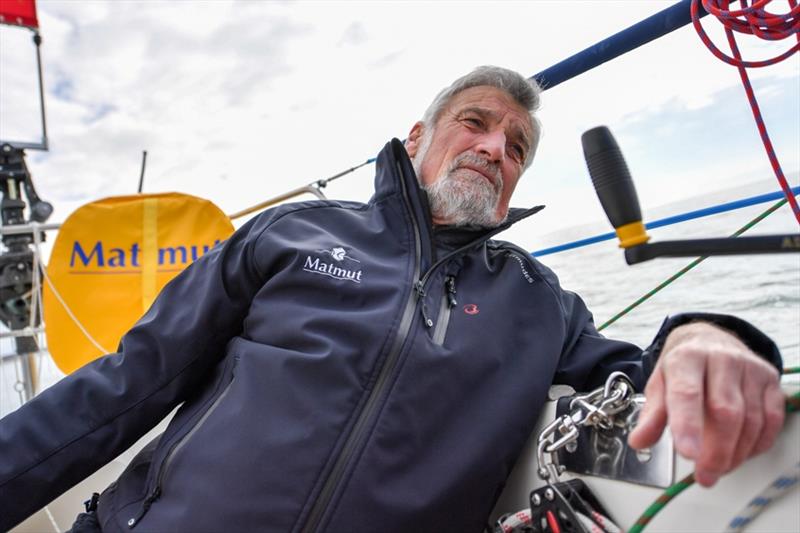
Checking in with the 2018 Golden Globe Race
by David Schmidt 20 Aug 2018 16:30 UTC
July 1, 2018-May 12, 2019

Jean-Luc Van Den Heede's windward course down the eastern side of the South Atlantic towards the Cape of Good Hope has proved better than the longer traditional Trade Wind route favoured by Mark Slats, and the Frenchman now leads the Dutchman by 575 miles © Christophe Favreau / Matmut / PPL
Spend enough time covering Jules Verne Trophy attempts for the fastest fully crewed circumnavigation, attempts at setting a new solo circumnavigation records, or even the singlehanded Vendee Globe, and you get used to seeing the boats make a lot of VMG progress in between position updates. Miss a few of these reports, and, in the case of Francois Gabart sailing aboard his maxi trimaran Macif in 2017, when the brave young French skipper set the stunning solo circumnavigation time of just 42 days, 16 hours, 40 minutes and 35 seconds, and it wasn't uncommon to see hundreds and hundreds of miles of progress.
Not so with the 2018 Golden Globe Race (GGR 2018). This retro race seeks to replicate the 1968-1969 Golden Globe Race, which was the world's first solo circumnavigation race and an event where legends were minted and where the horribly misguided Donald Crowhurst found infamy.
A quick rewind for readers who are just tuning into this test of human character, problem-solving abilities and sheer gumption: The GGR 2018 was the brainchild of race organizer Don McIntyre, an Australian adventurer and highly experienced bluewater sailor who was interested in replacing technology with grit and character. McIntyre accomplished this by creating the 2018 Golden Globe Race, which requires that contestants use era-specific boats (read: full keels and skegs), sails and navigational tools (read: sextants, not GPS receivers), and while all skippers sail with an emergency kit containing a GPS and a sat phone, breaking the seal on this box instantly relegates a contestant to the race's Chichester Class, which is a second-tier race for teams that either break their emergency-kit seals or stop for outside help.
Eighteen teams from 13 countries departed from Les Sables-d'Olonne, France, on July 1, 2018, with the goal of sailing around the globe, leaving all of the great capes to port and returning to Les Sables-d'Olonne at the end of their adventure, which could easily consume the lion's share of a year. As of this writing, two skippers-Phillippe Peche (FRA; 57) and Antoine Cousot (FRA; 47)-have been demoted to the Chichester Class, while four skippers- Ertan Beskardes (UK; 57), Kevin Farebrother (AUS; 50), Francesco Cappelletti (ITL; 40) and Nabil Amra (PLE; 42)-have quit due to unforeseen circumstances.
The remaining 12 skippers are currently being led by Jean-Luc van den Heede (FRA; 73), sailing aboard Matmut, his Rustler 36, followed by Mark Slats (NED; 41), sailing aboard The Ohpen Maverick, also a Rustler 36, and Are Wiig (NOR; 58), sailing aboard Olleanna, his OE32. As of this writing (more than 50 days since the starting gun sounded), the leaders are approaching the Cape of Good Hope at a blistering 4-5 knots of VMG-not exactly the same pace that Gabart threw down on his record-setting run, but as pace that holds plenty of drama for the competing skippers.
For example, on August 11, Peche suffered problems with his steering assembly when his tiller parted ways in 50 knots of air, and while his vessel wasn't in immediate danger, he made a call to his partner on his satellite phone, instantly relegating him to the Chichester Class.
A few days later Peche reported his decision to sail to Cape Town to properly repair his steed.
"The situation is that Philippe is now in the Chichester Class as if he had made one stop," said McIntyre in an official GGR 2018 release. "So if he now pulls in to Cape Town that would be a second infringement and he would be out of the Race altogether. He can apply for a time penalty for the phone call and we will reconsider that, because as far as we can ascertain, he did not receive any materiel assistance other than psychological support. If successful, this would reinstate him in the GGR, and allow him to continue in the Chichester Class after he stops in Cape Town."
As of this writing, Peche's bow was pointed at Cape Town, but there has not been any official word about the status of his application for a time penalty.
So while it has taken a bit of time to adjust to the pace of the GGR 2018 and the fact that the race tracker doesn't show appreciable latitude or longitude changes with each new position report, there's no question that there's plenty of drama unfurling, especially now that there's some separation between boats, meaning that the leaders could be experiencing vastly different weather and conditions than the back-half stragglers.
Also, unlike most other distance races, the GGR 2018's leaderboard offers predicted metrics for when each skipper is expected back in Les Sables-d'Olonne, France, and, as of now, the tracker is reporting that van den Heede, sailing in the pole position, should cross the finishing line on February 3, 2019 at 20:49 hours, while poor Mark Sinclair (AUS; 60), who is currently riding the unenviable DFL seat, isn't expected back in Les Sables-d'Olonne until May 12, 2019 at 17:36 hours. Talk about a finishing line delta!
May the four winds blow you safely home,
David Schmidt, Sail-World.com North American Editor